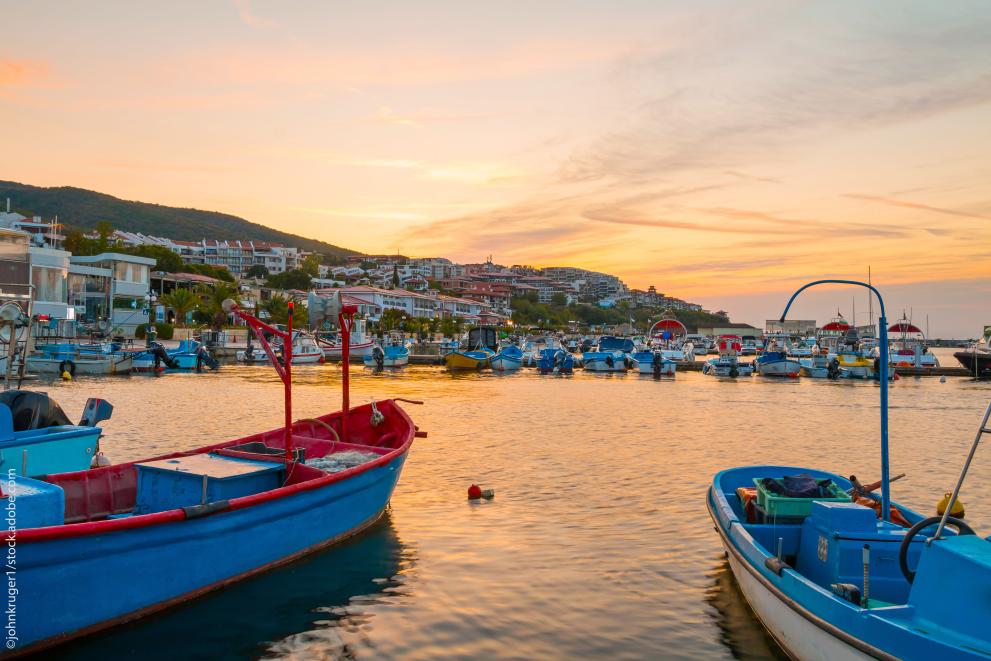
Today the European Commission and the European External Action Service adopted the 4th implementation report of the Black Sea Synergy, offering a review of this regional cooperation initiative for the 2019-2023 period.
The report shows that good progress was made on maritime affairs and fisheries, despite the impact of the COVID-19 pandemic and Russia’s war of aggression against Ukraine and its far-reaching consequences.
Sustainable blue economy, marine research, and innovation
On maritime affairs, the Common Maritime Agenda for the Black Sea (CMA) stands out as a key initiative during the 2019 -2023 period.
Established in 2019 as voluntary and sectoral cooperation between the participating countries, the CMA pushes for
- healthy marine and coastal ecosystems
- a competitive, innovative, and sustainable blue economy for the Black Sea, and
- investment in the Black Sea blue economy
With the EU’s steering and financial support, the implementation of the CMA marked concrete achievements in policy alignment and budget mobilisation, acting as a facilitator for cooperation and cohesion for all countries in the region and beyond.
In the past five years alone, the CMA has supported over 90 actions on marine pollution, blue economy entrepreneurship, tourism, and environmental protection worth about €500 million.
In the field of marine research and innovation, work on a common vision among Black Sea countries and the Republic of Moldova led to the establishment of the Strategic Research and Innovation Agenda (SRIA) as the scientific pillar to the Common Maritime Agenda. The SRIA set regional research objectives, resulting in more coordination on the structure of national research and innovation plans to achieve them. In addition to national research and innovation funding plans, EU financial support boosted the research investments in the region. The EU-funded programs Horizon 2020 and Horizon Europe have supported collaborative research projects for €37,5 million.
Fisheries and aquaculture
Fisheries governance and cooperation in fisheries in the Black Sea have been further improved and strengthened during the reporting period, based on the implementation of the roadmap established under the 2018 Sofia Ministerial Declaration.
Strengthened regional cooperation helped achieve technical and scientific advancements as well as joint actions. Partners cooperated to
- collect data and improve scientific advice through joint surveys at sea and developing common protocols to manage key fisheries and mitigate fisheries impacts to vulnerable species and habitats
- improve fisheries control and compliance
- step up the fight against illegal, unreported, and unregulated fishing (IUU) by implementing catch documentation schemes.
Aquaculture continued to play a key role in providing food security, economic growth, and employment in the region. It has become an increasingly important part of the blue economy in the region. To ensure its resilience and sustainability, several actions have been promoted to support Black Sea countries, including through technical assistance and ad hoc support.
Impact of Russia’s war of aggression against Ukraine
The report points out that the consequences of Russia’s war of aggression against Ukraine have added to the challenges and threats experienced already by the region. A new dimension has been brought to the transnational security threats, as navigation remains under pressure from floating sea mines and ongoing naval warfare. Similarly, Russia’s ongoing war against Ukraine has brought new economic, commercial, and environmentally related challenges, such as high war-related pollution figures.
The report highlights that freedom of navigation is obstructed and reached its lowest point since Second World War. It also underscored that Russia’s war of aggression against Ukraine is jeopardising global food security.
As part of the EU’s response, Russia’s participation in the Black Sea Synergy has been suspended, as all forms of cooperation with Russian public stakeholders.
Looking forward
The results of the 4th report on the Black Sea Synergy provide a good basis for reflection and planning for future EU policy in the region.
They confirm the added value of the bottom-up approach to project development and of the inclusive and voluntary nature of the Black Sea Synergy and its implementation. They also confirm the wide range of EU activities in the Black Sea which have sought to address existing and new challenges in the region such as those in the fields of environmental protection and climate change, cross-border cooperation, democracy and human rights, energy, and transport.
Background
Since 2007 the Black Sea Synergy (BSS) has been the EU’s regional policy framework for the Black Sea region, aiming to ensure policy coherence and further cooperation between the countries surrounding the Black Sea. In this context, the Black Sea Synergy reinforces the impact of existing cooperation instruments, such as the European Neighbourhood Policy, and particularly its Eastern Partnership.
The fields of cooperation covered by the Black Sea Synergy are
- Sustainable blue economy, marine research, and innovation.
- Fisheries and aquaculture.
- Environmental protection and climate change.
- Cross-border cooperation.
- Civil society engagement, democracy, and human rights.
- Education, research and innovation, culture, and tourism.
- Energy and transport.
The key elements of the Black Sea Synergy include i) building capacity, ii) fostering regional dialogue and iii) achieving tangible results for countries and citizens in the region, in a bottom-up and project-oriented approach.
Since its launch, the EEAS and the European Commission have published three implementation reports of the Synergy in 2008, 2015 and 2019, providing a snapshot of the progress achieved in the main areas of cooperation in the Black Sea region.
The 4th implementation report published today offers a factual review of the progress made in the 2019-2023 period, highlighting best practices and key achievements in the various sectors, to further inform the future development of this initiative.
More information
Press release: Black Sea Synergy: success in regional cooperation despite challenges (EEAS website)
Details
- Publication date
- 4 July 2024
- Author
- Directorate-General for Maritime Affairs and Fisheries
